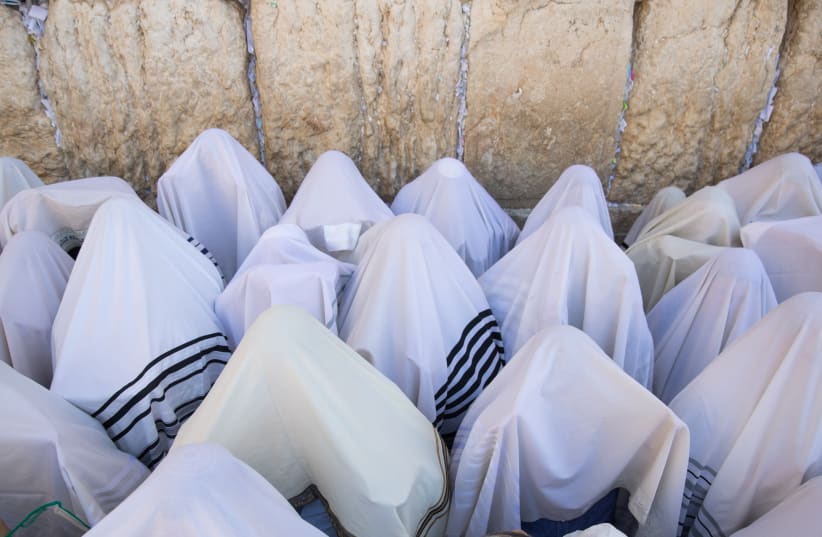This Shabbat, we will be reading Parashat Naso. Among other topics, we will read about Birkat Kohanim, the Priestly Blessing. God commanded the kohanim to bless the Children of Israel. To this very day, this special ceremony of the kohanim blessing the Jewish nation in God’s name takes place in synagogues every day in Israel, and on holidays outside of Israel.
These are the words with which the kohanim bless the Children of Israel:
“May the Lord bless you and watch over you. May the Lord cause His countenance to shine toward you and favor you. May the Lord raise His countenance toward you and grant you peace.” (Numbers 6:24-26)
This short divine blessing concludes with the word “peace.” We find that peace is a central theme that appears again and again in Jewish daily ritual, and it always gets the last word. The Amidah prayer ends with the blessing of peace. Kaddish ends with “May the One Who makes peace in the heavens…,” and likewise Birkat Hamazon, Grace after Meals.
According to the Talmud, the word “peace” is no less than one of the names of God. Since the days of the scriptures, when two Jews meet, they greet each other with the word Shalom, which means peace. According to ancient tradition, the name of the city of Jerusalem comes from the word Shalom.
We find echoes of this tradition in the Book of Psalms: “Request the welfare of Jerusalem; may those who love you enjoy tranquility. May there be peace in your wall, tranquility in your palaces. For the sake of my brethren and my companions, I shall now speak of peace in you. (Psalms 122:6-8)
We are obligated, therefore, to delve into the significance of the word “peace.” Why is peace such a fundamental component of a Jew’s life? And what is the ideal peace for which we yearn?
Simply speaking, peace is a state of no war or dispute. But in light of the importance attributed to peace, it’s hard to minimize it to just the lack of dissension. We must find its positive content, the kind that justifies the word peace being one of the names of God. It seems that not only does peace describe a passive state devoid of fighting, but it describes an active state of harmony, a reality in which all components contribute to one another.
The word shalem, meaning “whole,” comes from the word “shalom.” When components come together precisely, a completeness is created. We can take music as an example. When every musician in an orchestra plays the correct notes, at the right time and in the right order, the result is harmonious and whole.
The peace with which the Jewish nation is blessed undoubtedly refers to peace with our enemies around us and no divisiveness among us internally. But it also refers to much more: a reality in which all the members of the nation contribute to and are nourished by one another. The ideal state of peace is one in which there is no segment of the nation that separates itself. This does not mean it changes or blends in with other segments, but each group and each sector gives of its own uniqueness to other groups and sectors with everyone contributing of their own special expertise.
There is no one who does not have ideas that can benefit someone else. And when every idea reaches its target, this is “peace.” It is because the vision of peace is so uplifting and so fantastic, we repeat it over and over again every chance we get – in and out of the synagogue.
Almost 2000 years ago, Rabbi Judah HaNasi composed the Mishna in the Land of Israel: a tremendous project aimed at collecting, organizing, and writing all the commentary and halachot (Jewish laws) said during the Second Temple period and later, which until then had been passed orally from person to person. The Mishna ends with a statement that refers to Rabbi Shimon ben Halafta as saying: “The Holy One, Blessed be He, found no vessel which contains blessing for Israel save that of peace, as it is written: ‘The Lord will give strength unto his people; the Lord will bless his people with peace.’” (Psalms 29:11)
The Mishna (Masechet Oktzin 3) compares peace to a vessel that can be filled with blessings. Sometimes, we have everything we need to be happy in our lives: financial stability, rewarding work, a supportive society, and loving partners, yet we still don’t feel happy. This is because we lack peace, that vessel that allows all our blessings to be expressed. When we find the right place within ourselves, at work, in relationships… and through that we inspire those around us, then we have found the peace that allows us to enjoy all the goodness we have.
The writer is rabbi of the Western Wall and Holy Sites.
